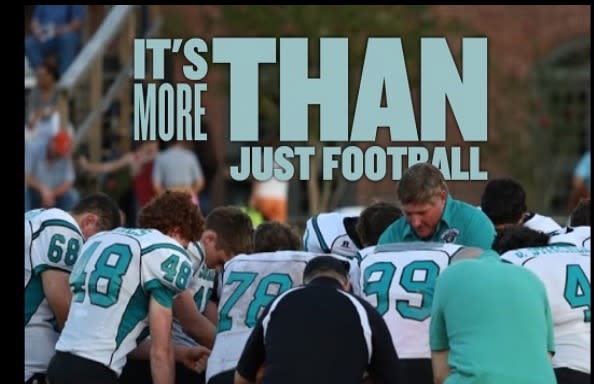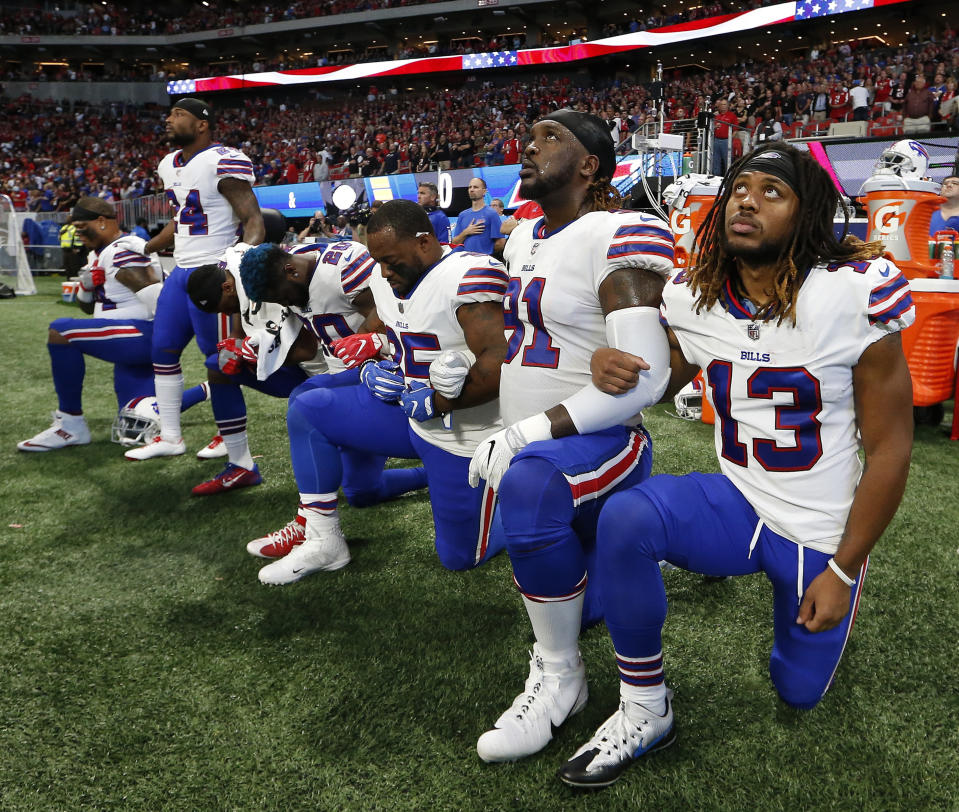2 high school protests during anthem, 2 different and emotional reactions
Late last week in Crosby, Texas, a high school football player named Larry McCullough knelt during the national anthem before a game. His coach, a former Marine named Ronnie Mitchem, walked over to him and said, “I thank you for your time as a Shark, but your time as a Shark is over.” McCullough and a teammate who raised a fist during the anthem were off the team.
Late last week in Charlotte, North Carolina, a group of cheerleaders knelt during the national anthem before a high school football game. The principal didn’t know it was coming. He later found a photo of the protest and put it on the school’s Instagram page. He also posted it on his personal Facebook page.
“I was proud of ’em,” the principal, Eric Ward, told Yahoo Sports on Monday.
Has he heard any objections from anyone in the Harding High community?
“I haven’t as of yet,” Ward said. “But it’s Monday.”

Down in Crosby, Monday was an ordeal for Mitchem. The 51-year-old told Yahoo Sports he has received death threats, along with people calling him a racist and a white supremacist. Mitchem is white and the two players who are no longer on his team are both black.
“I’ve got parents who are scared for kids to come to practice, out of fear,” Mitchem said, his voice breaking from emotion. “And this is what the millionaire football players did – their lives don’t change one bit.”
The true legacy of Colin Kaepernick’s protest more than a year ago may show up not in arms interlocked on NFL sidelines or a debate about television ratings, but rather in a generation of people who were born in this century. Over the past two weeks, since the start of the NFL season, there have been protests during the national anthem by high school football teammates, by cheerleaders, and even by volleyball players. In places like Charlotte, the protests were expected and welcomed as a way to heal. In places like Crosby, they were unexpected and augured the end of relationships.
Mitchem grew up in Ft. Walton Beach, Florida, and served in the Marines in the 1980s. He moved to the Houston area, became a pastor and started a church in 2004. In 2012, he started a football program for homeschooled kids in the area. It wasn’t much, but he wanted to help area teens and he loved the sport. He paid for some of the uniforms out of his own pocket and he drove the team van.

Kaepernick’s protest didn’t sit well with Mitchem last year, especially when the former San Francisco quarterback wore a T-shirt with Fidel Castro on the front. Being from Florida, he knew people drowned trying to get away from Cuban dictatorship.
“Wearing that T-shirt isn’t the way to get me to listen to you,” Mitchem said. “You know the young people will start [kneeling]. That’s been my fear, and the fear of many coaches.”
So last season he laid out a rule for his six-man team: No kneeling during the national anthem. In a public school, this would have interfered directly with First Amendment rights and Supreme Court precedent. But Victory & Praise Christian Academy isn’t public, and technically isn’t even a school.
This year, after the wave of NFL protests that followed President Donald Trump’s comments at an Alabama rally, he heard from the parent of Cedric Ingram-Lewis, McCullough’s cousin, that one or two of the team’s players might want to protest.
“Send them up here,” Mitchem said. “Let’s talk. I don’t want them protesting the national anthem. You can kneel in the end zone.” The coach said he even offered to publish an essay against racial injustice in the game brochure. He just didn’t want anyone on his team kneeling before the flag he served under.
Mitchem said he spoke with Ingram-Lewis and he thought there wouldn’t be an issue. But before the game last Thursday, McCullough knelt and Ingram-Lewis, his cousin, raised a fist. Mitchem asked McCullough to immediately change out of his uniform and leave his equipment there – he said it was because there were no locker rooms – and Ingram-Lewis quit the team in solidarity.
“If it’s just a flag, why after what happened in Las Vegas is it at half-mast?” Mitchem asked Monday, referring to the mass shooting in Nevada. “It represents a country in mourning. That’s the flag I served for.”
The coach said he is opposed to all forms of injustice and he remains more than willing to talk it out with the players. He broke down in tears as he spoke of his commitment to the two teens.
“No matter what, your pastor is going to love you,” he said. “I didn’t expect all this to happen. We’re just a six-man football team. It was just about, ‘Hey, these are the rules. But you can protest.’ ”

Rhonda Brady, the mother of Ingram-Lewis, told the Houston Chronicle, “I don’t want them back on the team. A man with integrity and morals and ethics and who truly lives by that wouldn’t have done anything like that.”
The fissure may not heal. “I hate that NFL players can’t see what they’re doing to the country,” Mitchem said.
Across the country, Ward looked at the NFL protests and saw something entirely different. Charlotte is a city that was rattled by riots after the police shooting of a black man named Keith Lamont Scott in 2016. Demonstrations filled the streets of Uptown, only a short drive from the school. Harding has 90 percent of its students on free or reduced lunch, and for many kids there is little respite from fear.
So Ward advised his teachers not to shush expression, but encourage it. “Make sure you allow their voice and not necessarily suppress it,” he said. “A lot of these situations are happening to their friends. They’re not going to learn unless they get it off their minds and hearts.”
Last year, many of the Harding High students exited school during the lunch hour one day and gathered around a tree. They passed a microphone around and spoke to each other about their feelings. Some recited poetry. Ward felt it was important and needed.
“We can put them in somewhat of a bubble but real life comes up after high school,” he said. “It’s up to us to teach them how to peacefully respond, to know how to handle it. They look to us for guidance.”
So to Ward, kneeling during the anthem isn’t anti-America, anti-military or anti-flag. It’s a positive, peaceful way to cope.
“They did not disrespect the flag in my opinion,” the principal said. “It was nothing about the flag; it was racism and violence in the community that they want to stop.”
And as for those who have an issue with the method of protest?
“My reaction would be: How would they prefer students voice their opinion?” Ward said. “And what punishment should a child have for social consciousness?”
It’s notable that both Mitchem and Ward have issues with the NFL protests. Mitchem feels “the NFL has set a poor example.” Ward feels the pro football demonstrations have been too watered down.
“I do think the original point of the protest has made an impression,” he said. “But I think it’s our job to remind them what it’s for. You may have children who come into the game late and they’re picking up what is happening now and not realizing what it’s for.”
The national conversation about the NFL protests often derails into tangential issues like how television covers the anthem and whether kneeling before the song really means anything. At the high school level though, away from the cameras, the conversations and the emotions are real and raw.
“If we could just get through this racial barrier,” Mitchem said. “I personally think it’s a Satanic thing. The devil knows it’s the easiest thing for him to use. He’s working to divide the country.”
Some might say the country was already divided, and healing begins only when the fracture is exposed. But in either case, the job falls to parents, coaches, educators and the clergy to lead after the anthem is over.
More from Yahoo Sports:
• How the Yankees bullpen pulled off a wild-card miracle
• Mark Cuban considering a presidential run
• Soccer star apologizes for ‘rowdy’ incident at Disney World
• What missing World Cup would mean for U.S. soccer

